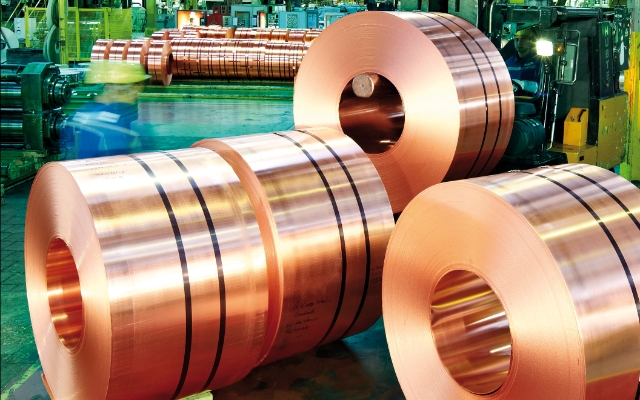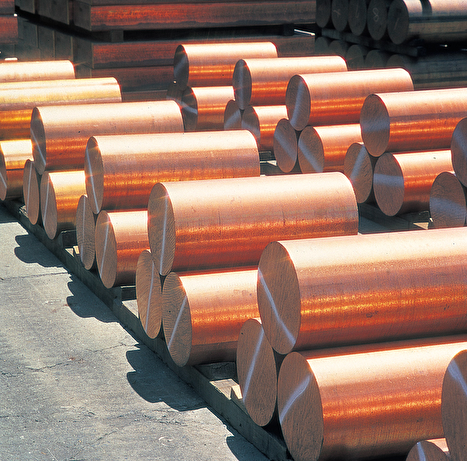The Ultimate Guide to Sustainable Coping With Eco-Friendly Copper Products
The Ultimate Guide to Sustainable Coping With Eco-Friendly Copper Products
Blog Article
Exactly How Copper Products Contribute to Sustainable Practices in Numerous Sectors
In renewable power systems, for example, copper improves the capability of solar and wind technologies, while its application in construction lessens waste through longevity. As industries look for to embrace more sustainable practices, the function of copper could confirm crucial in attaining ecological goals.
Copper in Renewable Resource
Copper plays a critical role in the improvement of renewable resource technologies, functioning as an essential conductor in different applications. Its phenomenal electrical conductivity and resistance to rust make it an ideal material for electric wiring, which is necessary in photovoltaic panels, wind turbines, and energy storage systems. In solar photovoltaic systems, copper is used in the interconnections and wiring, making it possible for efficient power conversion from sunshine to electricity.
In wind energy, copper is essential to the generators and transformers that transform kinetic energy into electric energy, guaranteeing ideal performance and dependability. Furthermore, the need for electric vehicles (EVs) is increasing, with copper being a key element in batteries, electric motors, and billing infrastructure. The change to EVs significantly improves the demand for copper, as these lorries usually make use of 4 times much more copper than standard internal combustion engine automobiles.
As the globe seeks to minimize environment change and shift to lasting energy sources, copper's function comes to be significantly important. The material not only enhances the effectiveness and durability of eco-friendly power systems however also sustains the more comprehensive objective of decreasing greenhouse gas emissions and promoting a lasting future.
Eco-Friendly Building Materials
Recently, there has been a noteworthy change in the direction of the adoption of environment-friendly building products in feedback to growing environmental concerns. This adjustment is motivated by the requirement for lasting alternatives that lessen ecological impacts while keeping architectural integrity and visual appeal.
Copper, recognized for its longevity and recyclability, has actually become a principal in this field. It can be utilized in roof covering, plumbing, and electric systems, adding to energy effectiveness and decreasing waste. Copper's longevity implies fewer replacements in time, further boosting its sustainability profile.
Furthermore, materials such as bamboo, recovered timber, and recycled steel are getting popularity. These choices not just use decreased environmental influence but likewise advertise resource conservation. As constructing codes significantly stress sustainability, architects and contractors are incorporating these materials into their jobs, cultivating technology in design.
The raising adoption of green construction products shows a wider dedication to sustainability in the developed setting. By prioritizing these materials, the construction sector can considerably reduce its carbon footprint, straighten with regulative criteria, and sustain a healthier ecosystem for future generations. This trend marks a crucial action in the direction of a much more sustainable future in construction.
Copper's Role in Health care
Current research studies have actually highlighted the significant function of copper in health care setups, especially as a result of its antimicrobial properties. Copper surfaces have been revealed to minimize the visibility of virus, consisting of viruses and germs, by approximately 99.9% within a short duration. This impressive efficacy makes copper an important material for high-touch surfaces in medical facilities, such as doorknobs, bed rails, and IV poles, thus contributing to enhanced infection control procedures.
Along with its direct antimicrobial effects, copper also plays a role in the more comprehensive context of medical facility sustainability (Copper Products). By integrating copper into medical devices and furnishings, health care facilities can lower the incidence of healthcare-associated infections (HAIs), which not only boosts client outcomes however likewise reduces the expenses associated with extended healthcare facility stays and additional therapies
Additionally, copper's resilience and recyclability straighten with lasting practices, enabling liable source management. As medical care systems increasingly prioritize both client security and ecological stewardship, the combination of copper items is becoming much more prevalent. This twin advantage underscores copper's vital contribution to a much healthier, much safer, and more sustainable health care setting.
Sustainability in Transportation

In addition, copper's toughness and deterioration resistance add to the longevity try this website of transportation facilities (Copper Products). In rail systems, for circumstances, copper elements improve the dependability and efficiency of signaling and power systems, essential for lowering delays and power consumption. Furthermore, copper's role in sustainable power systems, such as solar and wind, supports sustainable transport solutions by providing tidy energy for electrical transportation choices
Investments in copper modern technology not only foster sustainability however additionally stimulate economic growth and work production in eco-friendly industries. As industries strive to fulfill rigorous environmental laws, the application of copper products in transport becomes a critical strategy in accomplishing sustainability objectives and advertising a cleaner, more efficient future.
Copper and Round Economic Climate
As the globe significantly embraces sustainability, the role of copper in the circular economic climate comes to be ever before more considerable. Copper's inherent homes-- such as its longevity, conductivity, and recyclability-- setting it as an essential material in a resource-efficient economic situation. The circular economic climate aims to decrease waste and optimize resource use through recycling and reusing materials, and copper excels in this regard.
The steel can be recycled indefinitely without loss of high quality, making it an excellent candidate for sustainable practices across numerous fields, including construction, electronic devices, and renewable resource. By recuperating and reprocessing copper from end-of-life items, industries can dramatically reduce the demand for virgin materials, therefore decreasing environmental impacts related to mining and handling.
Additionally, the combination of copper right into round economy frameworks not only conserves sources yet also promotes development. Companies that focus on copper reusing add to a more lasting supply chain, improving their competition while aligning with regulatory needs and customer preferences for ecologically responsible items.
Conclusion
In conclusion, copper products considerably add to sustainable techniques throughout multiple markets. Their crucial role in improving eco-friendly power innovations, advertising environment-friendly construction materials, sustaining infection control in health care, facilitating lasting transport, and personifying the principles of a Discover More round economic climate emphasizes the convenience and significance of copper. By integrating copper into different applications, industries can achieve higher effectiveness, lower environmental influence, and align with worldwide sustainability objectives, inevitably fostering a much more sustainable future.

Copper's superb conductivity makes it a favored material in electrical car (EV) systems, enhancing energy performance and performance. Additionally, copper's role in renewable energy systems, such as solar and wind, supports sustainable transportation solutions by supplying tidy power for electrical transit options.
Their necessary function in improving renewable power innovations, advertising green building and construction products, supporting infection control in health care, helping with sustainable transport, and embodying the principles of a circular economy underscores the convenience and importance of copper.
Report this page